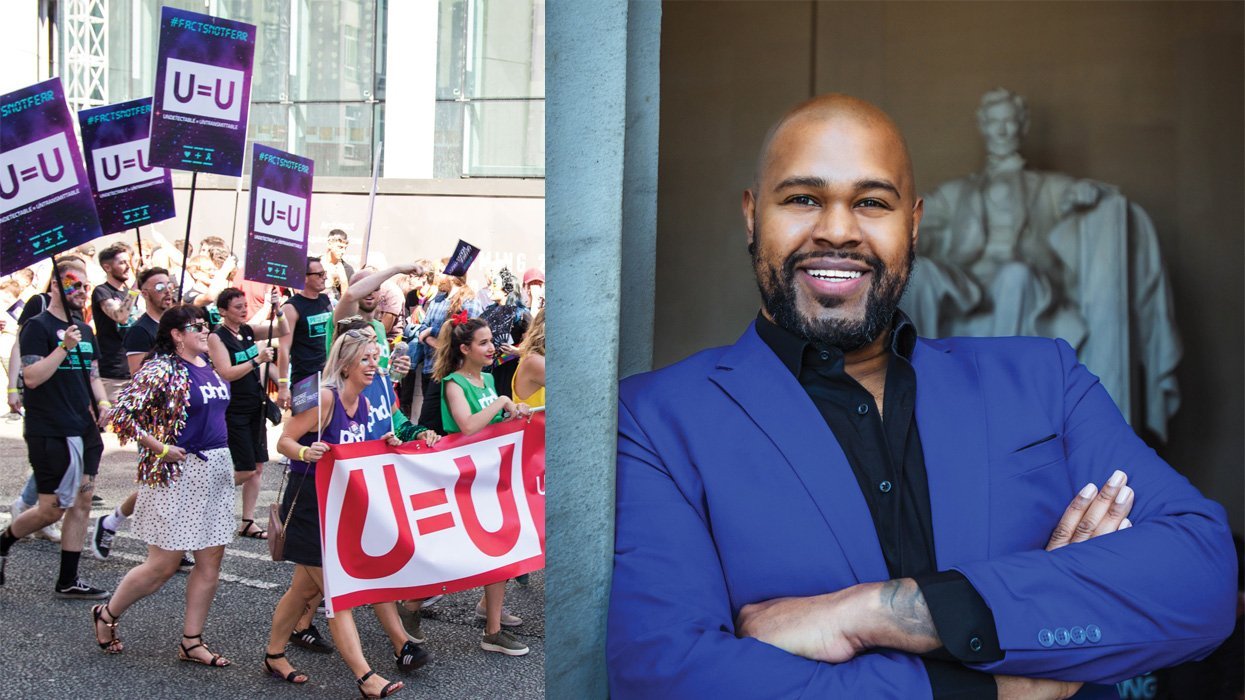
Treatment GuideJust DiagnosedSex & DatingAfrican AmericanStigmaAsk the HIV DocPrEP En EspañolNewsVoicesPrint IssueVideoOut 100
CONTACTCAREER OPPORTUNITIESADVERTISE WITH USPRIVACY POLICYPRIVACY PREFERENCESTERMS OF USELEGAL NOTICE
© 2024 Pride Publishing Inc.
All Rights reserved
All Rights reserved
By continuing to use our site, you agree to our Private Policy and Terms of Use.
Derrick Mitchell was once drug-addicted and homeless, barely getting by on the streets of New York City. At a syringe exchange, he was introduced to New York's HIV/AIDS Services Administration (HASA), a public program that connects low-income HIVers with medications, health services, job programs, food stamps, and housing. Mitchell wouldn't start utilizing the program until after a drug-related arrest, but he's thankful he did'he's now sober, healthy, and has his own apartment. 'I was able to have a place to live that was clean and safe and afforded me the time to sit back and assess what I was doing with my life,' Mitchell says. 'All that came from contact with HASA and my HASA worker.' The HASA program, as valuable as it is, is under attack by New York City bureaucrats, specifically Mayor Michael Bloomberg, who wants to prune the agency's staff in an effort to balance the budget. Bloomberg's proposal included the elimination of one third of HASA's case managers; he unsuccessfully proposed the same cuts last year. HASA is just one of dozens of AIDS programs that have become vulnerable in these days of government penny-pinching. But a reprieve for New York's low-income HIV population has come from a federal judge who stopped the city from slicing HASA's payrolls. Judge Cheryl Pollak ruled in April that Bloomberg's proposal must be taken off the table. Attorneys for the HIV Law Project and Housing Works, a group that works to keep low-income people with HIV from living on the street, have been fighting for years to keep HASA from being winnowed away. But the organizations have law on their side. After Mayor Rudy Giuliani slashed HASA funding Housing Works filed suit in 1995. Finally, in 2001, a court ruled that the agency's reduced staff was failing their clients, violating the Americans with Disabilities Act, and creating 'devastating consequences.' A federal court order was issued that demanded the agency maintain adequate case managers, specifically a ratio of 34 clients to one manager. After he was elected mayor in November 2001, Bloomberg appealed the court order to the Supreme Court, but the judges refused to hear the case and the order stood. Likely anticipating legal challenges to the order, New York's progressive-leaning city council passed a law that essentially said the same thing as the order'HASA must have enough case managers to uphold a 34-1 ratio. Bloomberg's more recent assaults on HASA started last year, when his budget proposal called for a chop of 246 case managers. Housing Works and the HIV Law Project filed suit and the cuts were withdrawn. This year's budget again called for slashing HASA's case managers, this time by 254. Housing Works went to court to stop the latest budget from going forward and were successful'the judge called the mayor's budget proposal 'illegal,' prompting applause in the Brooklyn courtroom. 'Our folks live with wasting, dementia, neuropathy, immobility,' says Armen Merjian, a senior staff attorney for Housing Works. Of the need for HASA, Merjian says, 'It's very difficult to go to 15 different disease-ridden waiting rooms to wait for different benefits; it's difficult to fill out paperwork.' Even though 'we're living in this starve-the-beast-and-break-the-social-contract age,' Merjian says he and Housing Works will continue fighting for low-income people with HIV.
From our Sponsors
Most Popular
The science behind U=U has been liberating people with HIV for years
June 04 2024 3:31 PM
As Pride party season begins, the CDC urges mpox vaccinations
May 16 2024 6:52 PM
Exclusive: We kiki with Q from 'RuPaul's Drag Race'
June 24 2024 11:37 AM
The freedom of disclosure: David Anzuelo's journey through HIV, art, and advocacy
August 02 2024 12:21 PM
The Talk: Thriving with HIV
May 08 2024 10:45 AM
The Talk: What HIV isn’t
May 07 2024 10:48 AM
Activist and philanthropist Bruce Bastian dies at 76
June 26 2024 1:28 PM
In honor of Juneteenth 2024, meet The Normal Anomaly
June 19 2024 1:39 PM
Plus: Featured Video
Latest Stories
Meet our Health Hero of the Year, Armonté Butler
October 21 2024 12:53 PM
AIDS/LifeCycle is ending after more than 30 years
October 17 2024 12:40 PM
Twice-yearly injectable lenacapavir, an HIV-prevention drug, reduces risk by 96%
October 15 2024 5:03 PM
How fitness coach Tyriek Taylor reclaims his power from HIV with self-commitment
September 19 2024 12:00 PM
Out100 Honoree Tony Valenzuela thanks queer and trans communities for support in his HIV journey
September 18 2024 12:00 PM
Kentucky bans conversion therapy for youth as Gov. Andy Beshear signs 'monumental' order
September 18 2024 11:13 AM
Why activist Raif Derrazi thinks his HIV diagnosis is a gift
September 17 2024 12:00 PM
Creator and host Karl Schmid fights HIV stigma with knowledge
September 12 2024 12:03 PM
Study finds use of puberty blockers safe and reversible, countering anti-trans accusations
September 11 2024 1:11 PM
Latinx health tips / Consejos de salud para latinos (in English & en espanol)
September 10 2024 4:29 PM
The Trevor Project receives $5M grant to support LGBTQ+ youth mental health in rural Midwest (exclusive)
September 03 2024 9:30 AM
Introducing 'Health PLUS Wellness': The Latinx Issue!
August 30 2024 3:06 PM
La ciencia detrás de U=U ha estado liberando a las personas con VIH durante años
August 23 2024 2:48 PM
Tratamiento y prevención del VIH por inyección: Todo lo que necesita saber
August 23 2024 2:41 PM
Sr. Gay World quiere asegurarse de que estés bien
August 23 2024 2:30 PM
Eureka is taking a break from competing on 'Drag Race' following 'CVTW' elimination
August 20 2024 12:21 PM
With a new case in Sweden, what is the new mpox outbreak and should you be concerned?
August 15 2024 4:48 PM
From ‘The Real World’ to real life: How Danny Roberts thrives with HIV
July 31 2024 5:23 PM
















































































